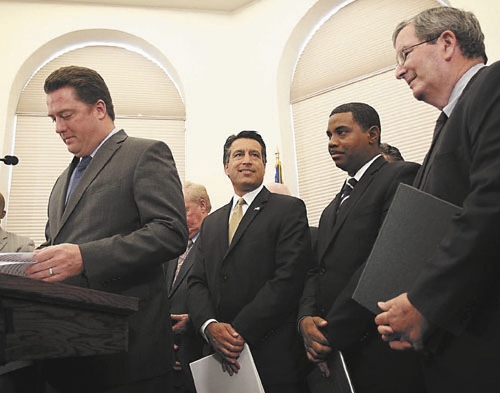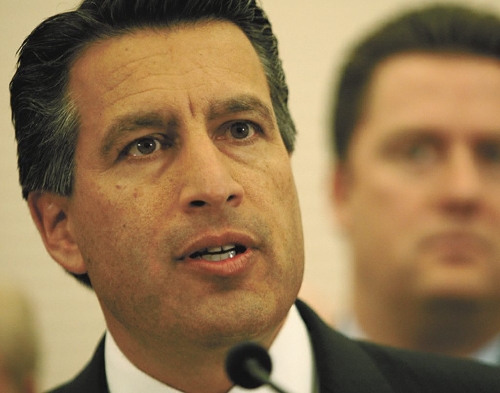Sandoval, lawmakers reach budget deal



CARSON CITY — Republican Gov. Brian Sandoval and the Democrat-controlled Legislature agreed to a $6.2 billion general fund budget plan Wednesday that reduces government spending but avoids drastic cuts to education and social services.
The two-year budget was balanced in part with about $620 million in taxes Sandoval and other Republicans hoped would expire, or sunset. But Democrats said the revenues were necessary to lessen the impact on teachers, college students and the poor.
In exchange for Republicans agreeing to extend the taxes, Democrats agreed to a slate of reforms to laws covering education, collective bargaining and public employee benefits.
"With the budget and reforms we enacted, massive teacher layoffs and unacceptable increases in class size can be avoided," Sandoval said, standing before dozens of lawmakers, reporters and lobbyists in the legislative building.
The budget agreement — forged after five days of round-the-clock negotiations — eliminated hundreds of millions of dollars in borrowing, diversions and one-time money grabs that had been included in earlier proposals.
"The gimmickry is gone," said Jeremy Aguero, an analyst at the Las Vegas-based economic research firm Applied Analysis. "I think both sides did a hell of a job."
The compromise budget came together after months of fighting between lawmakers and the governor, an ongoing confrontation that included student protests outside the Legislative Building and heated confrontations in the hallways and private meeting rooms.
"I can’t say we didn’t holler at each other once in a while but we all came back to the table," said Senate Minority Leader Mike McGinness, R-Fallon.
The impetus to make a deal came from a May 26 Supreme Court decision that suggested the state couldn’t grab money from cities, counties and other local entities. The case involved a $62 million water fund in Clark County, but Sandoval thought it called into question other local money diversions that accounted for 10 percent of his budget.
Assembly Speaker John Oceguera, D-Las Vegas, said it was important to constituents that the fighting ended in time to close a budget before the scheduled June 6 conclusion of the session.
"They wanted us to reach consensus to avoid the kind of deadlock that often paralyzes government," Oceguera said. The result is a 2011-13 general fund budget of $6.2 billion, roughly the same amount as the general fund budget for 2009-11.
The total state budget, a figure that includes highway money, federal funds and other revenue, will be $17.4 billion, a decrease of about $500 million from the current budget.
"We made cuts, we secured revenue, most importantly we listened to our constituents," said Senate Majority Leader Steven Horsford, D-Las Vegas. "We took a balanced approach to the budget."
Although cuts under the compromise budget aren’t as bad as they would have been under Sandoval’s original proposal, which didn’t include the sunset taxes, the state’s higher education system will face losses.
Nevada System of Higher Education Chancellor Dan Klaich said funding for the state’s colleges and universities would be 15 percent less than two years ago, some of which will be made up with a 13 percent increase in tuition.
"But this was a significant improvement," said Klaich, who watched as the governor and legislators announced the agreement. "We can keep our infrastructure intact. We can avoid significant layoffs. Our job now is to put it all together."
Jim Richardson, lobbyist for the Nevada Faculty Alliance, remained skeptical.
"We are still going to be losing a lot of funding," said Richardson, adding that the 15 percent reduction is on top of a 20 percent cut in 2009.
K-12 schools fared better than colleges and universities.
State Superintendent of Public Instruction Keith Rheault estimated the budget deal will bring about $80 million more to Nevada’s public schools. The increase will boost per pupil support above the current $5,188 and is much higher than Sandoval’s original proposal. Earlier in the session, Rheault calculated per pupil support would drop to $4,870. Now, per pupil support this fall will be $5,263. That will increase to $5,374 in fall 2012.
"It’s about $400 more per student than that we originally were looking at," Rheault said.
Joyce Haldeman, Clark County School District associate superintendent, noted that local property tax revenue received by the district has dropped by $113 million, so she could not say that employees won’t be laid off.
"We have more money today than yesterday, so I am happier," Haldeman said.
Craig Stevens, lobbyist for the Nevada State Education Association, said teachers and school employees will suffer at least a 9 percent salary cut next fall.
The budget compromise includes a 2.5 percent salary reduction, plus a requirement that teachers contribute 5.3 percent of their salary toward their retirement benefits. Salary reductions must be negotiated between teachers unions and school districts.
Sen. Sheila Leslie, D-Reno, was not rejoicing over the agreement.
"There still will be (education) layoffs," she said. "This is not a budget anyone can be proud of."
The budget compromise also includes several reforms wanted by Sandoval and other Republicans.
Primarily, Democrats agreed to change state law to bring an end to "last in, first out" policies school districts use to make layoffs. Under the change, achievement and job performance by teachers and administrators would be factors in layoff decisions, in addition to seniority.
The reforms also include changes to the state Board of Education. Instead of an elected 10-member board, a new 11-member board will be created that will include four elected members, each from a congressional district, and others who will be appointed by the governor, the Senate majority leader and the Assembly speaker.
The budget compromise didn’t include a change sought by Assembly Republicans to state law regarding construction defect liability. Current law results in contractors paying exorbitant legal fees to handle frivolous lawsuits, they argued.
Democrats agreed to approve Assembly Bill 401 which makes some changes to the liability law but doesn’t eliminate the language Republicans wanted out.
Said Assembly Minority Leader Pete Goicoechea, R-Eureka: "I don’t think either side got everything they wanted."
Contact reporter Benjamin Spillman at bspillman@reviewjournal.com or 702-477-3861.












